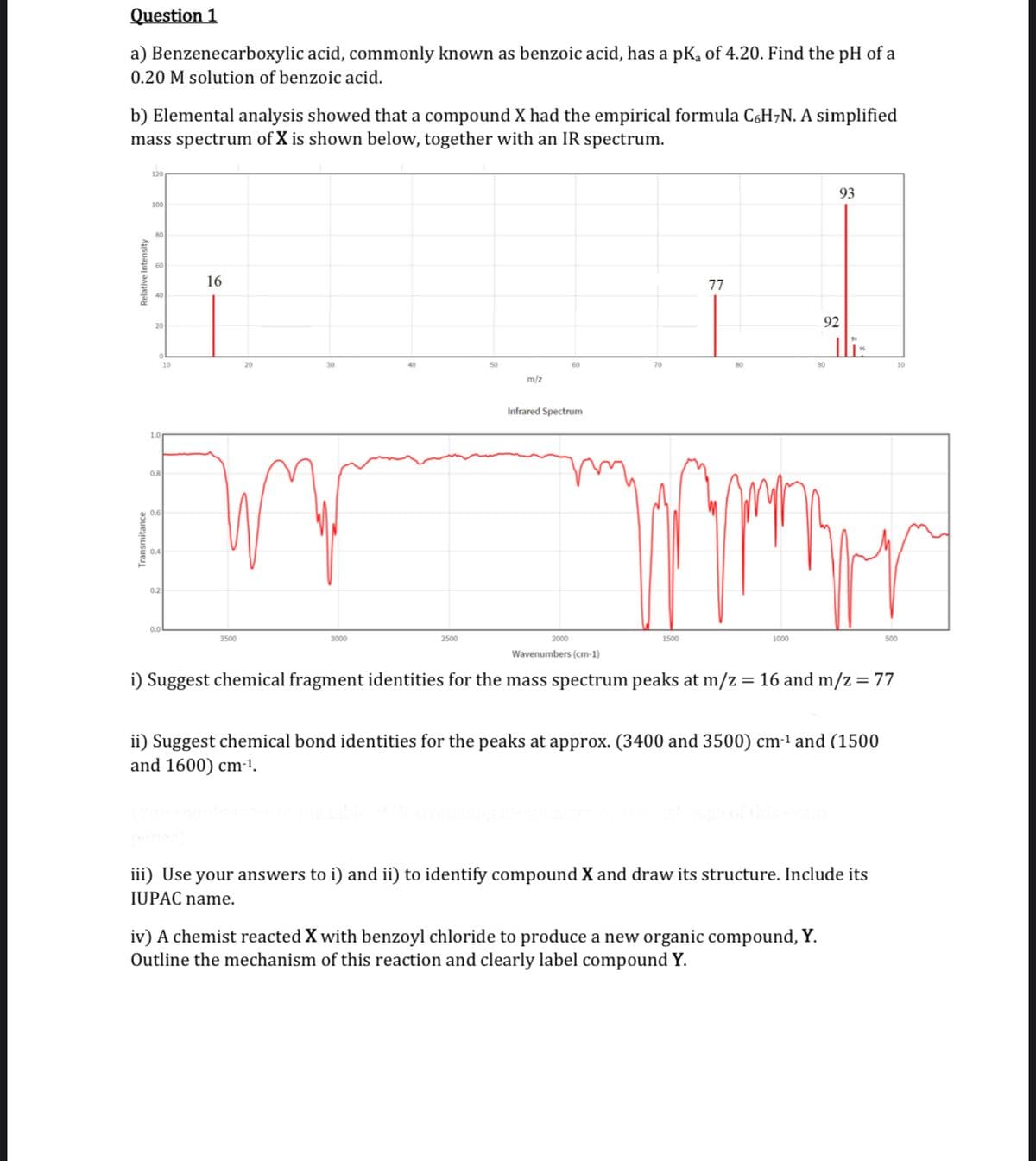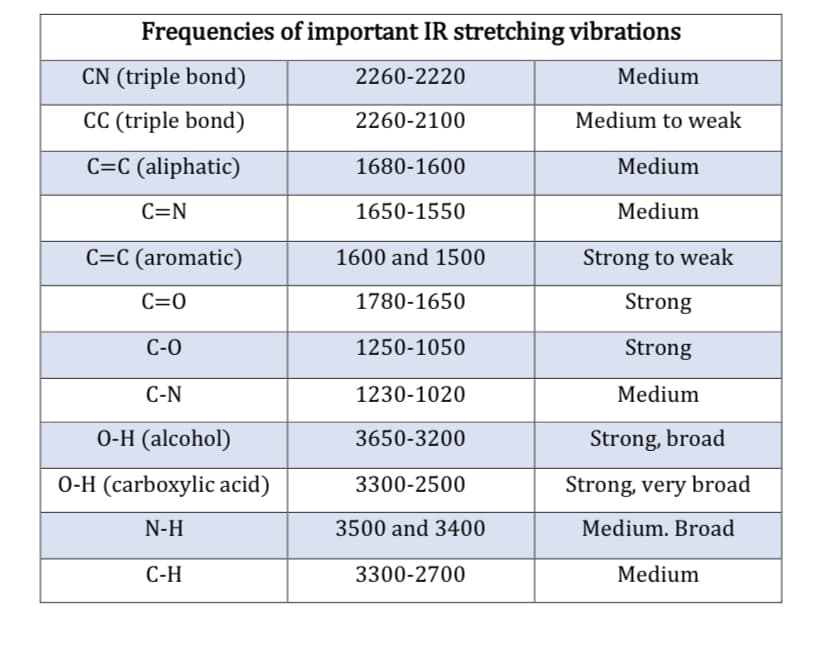Question 1 a) Benzenecarboxylic acid, commonly known as benzoic acid, has a pK, of 4.20. Find the pH of a 0.20 M solution of benzoic acid. b) Elemental analysis showed that a compound X had the empirical formula C6H7N. A simplified mass spectrum of X is shown below, together with an IR spectrum. 1.0 0.8 0.2 0.0 10 16 3500 m/2 Infrared Spectrum 2000 1500 77 1000 90 93 92 Mi: M Wy Wavenumbers (cm-1) i) Suggest chemical fragment identities for the mass spectrum peaks at m/z = 16 and m/z = 77 iv) A chemist reacted X with benzoyl chloride to produce a new organic compound, Y. Outline the mechanism of this reaction and clearly label compound Y. ii) Suggest chemical bond identities for the peaks at approx. (3400 and 3500) cm-¹ and (1500 and 1600) cm-¹. iii) Use your answers to i) and ii) to identify compound X and draw its structure. Include its IUPAC name. 10
Question 1 a) Benzenecarboxylic acid, commonly known as benzoic acid, has a pK, of 4.20. Find the pH of a 0.20 M solution of benzoic acid. b) Elemental analysis showed that a compound X had the empirical formula C6H7N. A simplified mass spectrum of X is shown below, together with an IR spectrum. 1.0 0.8 0.2 0.0 10 16 3500 m/2 Infrared Spectrum 2000 1500 77 1000 90 93 92 Mi: M Wy Wavenumbers (cm-1) i) Suggest chemical fragment identities for the mass spectrum peaks at m/z = 16 and m/z = 77 iv) A chemist reacted X with benzoyl chloride to produce a new organic compound, Y. Outline the mechanism of this reaction and clearly label compound Y. ii) Suggest chemical bond identities for the peaks at approx. (3400 and 3500) cm-¹ and (1500 and 1600) cm-¹. iii) Use your answers to i) and ii) to identify compound X and draw its structure. Include its IUPAC name. 10
Chemistry
10th Edition
ISBN:9781305957404
Author:Steven S. Zumdahl, Susan A. Zumdahl, Donald J. DeCoste
Publisher:Steven S. Zumdahl, Susan A. Zumdahl, Donald J. DeCoste
Chapter1: Chemical Foundations
Section: Chapter Questions
Problem 1RQ: Define and explain the differences between the following terms. a. law and theory b. theory and...
Related questions
Question
ii,iii,iv

Transcribed Image Text:Question 1
a) Benzenecarboxylic acid, commonly known as benzoic acid, has a pK₁ of 4.20. Find the pH of a
0.20 M solution of benzoic acid.
b) Elemental analysis showed that a compound X had the empirical formula C6H₂N. A simplified
mass spectrum of X is shown below, together with an IR spectrum.
Relative Intensity
120
100
80
20
0.8
0.2
0.0
10
16
3500
20
30
3000
40
2500
50
m/z
60
Infrared Spectrum
2000
70
1500
77
80
1000
90
93
92
TR
iv) A chemist reacted X with benzoyl chloride to produce a new organic compound, Y.
Outline the mechanism of this reaction and clearly label compound Y.
Wavenumbers (cm-1)
i) Suggest chemical fragment identities for the mass spectrum peaks at m/z = 16 and m/z = 77
ii) Suggest chemical bond identities for the peaks at approx. (3400 and 3500) cm-¹ and (1500
and 1600) cm-¹.
iii) Use your answers to i) and ii) to identify compound X and draw its structure. Include its
IUPAC name.
10
500

Transcribed Image Text:Frequencies of important IR stretching vibrations
CN (triple bond)
CC (triple bond)
C=C (aliphatic)
C=N
C=C (aromatic)
C=0
C-O
C-N
O-H (alcohol)
O-H (carboxylic acid)
N-H
C-H
2260-2220
2260-2100
1680-1600
1650-1550
1600 and 1500
1780-1650
1250-1050
1230-1020
3650-3200
3300-2500
3500 and 3400
3300-2700
Medium
Medium to weak
Medium
Medium
Strong to weak
Strong
Strong
Medium
Strong, broad
Strong, very broad
Medium. Broad
Medium
Expert Solution
This question has been solved!
Explore an expertly crafted, step-by-step solution for a thorough understanding of key concepts.
Step by step
Solved in 4 steps with 3 images

Knowledge Booster
Learn more about
Need a deep-dive on the concept behind this application? Look no further. Learn more about this topic, chemistry and related others by exploring similar questions and additional content below.Recommended textbooks for you

Chemistry
Chemistry
ISBN:
9781305957404
Author:
Steven S. Zumdahl, Susan A. Zumdahl, Donald J. DeCoste
Publisher:
Cengage Learning

Chemistry
Chemistry
ISBN:
9781259911156
Author:
Raymond Chang Dr., Jason Overby Professor
Publisher:
McGraw-Hill Education

Principles of Instrumental Analysis
Chemistry
ISBN:
9781305577213
Author:
Douglas A. Skoog, F. James Holler, Stanley R. Crouch
Publisher:
Cengage Learning

Chemistry
Chemistry
ISBN:
9781305957404
Author:
Steven S. Zumdahl, Susan A. Zumdahl, Donald J. DeCoste
Publisher:
Cengage Learning

Chemistry
Chemistry
ISBN:
9781259911156
Author:
Raymond Chang Dr., Jason Overby Professor
Publisher:
McGraw-Hill Education

Principles of Instrumental Analysis
Chemistry
ISBN:
9781305577213
Author:
Douglas A. Skoog, F. James Holler, Stanley R. Crouch
Publisher:
Cengage Learning

Organic Chemistry
Chemistry
ISBN:
9780078021558
Author:
Janice Gorzynski Smith Dr.
Publisher:
McGraw-Hill Education

Chemistry: Principles and Reactions
Chemistry
ISBN:
9781305079373
Author:
William L. Masterton, Cecile N. Hurley
Publisher:
Cengage Learning

Elementary Principles of Chemical Processes, Bind…
Chemistry
ISBN:
9781118431221
Author:
Richard M. Felder, Ronald W. Rousseau, Lisa G. Bullard
Publisher:
WILEY